
‘Latitudes & Attitudes’ World Headquarters Claimed by Fire
The fires raging on the West Coast have caused unimaginable devastation. For many it is headline news, for others it is much more personal. One of the personal stories belongs to Bob Bitchin and Jody Lipkin, publishers of Latitudes & Attitudes magazine. Their home, which also served as their magazine headquarters, has been completely destroyed in the wildfires. Bob often sends out newsletters with a beautiful cruising photo under the header “Why We Cruise.” Surely this would have been a good time to be in a boat surrounded by water rather than on land surrounding a lake. While sailing adventures are created on the high seas, the production of a magazine mostly happens on the land.

The pictures above capture only a fraction of the destruction resulting from the so-called North Complex fire near Lake Oroville — not far from Paradise, CA, which was devastated in the 2018 fires. Bob and Jody were on standby during that fire as well, but were ultimately safe.
This time not so. Bob says they were given the call to evacuate at 3 a.m. and were able to get out of the fire zone with minimal possessions, but including their laptops and hard drives. So business can continue, but clearly that provides only some relief. Bob says, in the short term, he and Jody have been able to retreat to the home of their friend and co-worker Lisa O’Brien. Lisa’s 47-ft trawler Traveler is located in the San Juan Islands, meaning that for now Bob and Jody are back on the water, a place that will hopefully give them the space and opportunity to recover and chart their course.
Amazingly, Bob had a webcam that recorded the fire as it approached their home after they had escaped to safer terrain.
We generally catch up with Bob and Jody at the Pacific Sail & Power Boat Show, and see them every fall at the Annapolis Boat Show. Since we missed each other in the spring, I gave Bob a call earlier in the summer to discuss the sailing and publishing business. As always it was a fun, enlightening and interesting talk during which Bob was again generous with his knowledge and insights.

Like so many sailors Bob and Jody have occasionally had to reef sails, adjust course, and simply manage whatever the world throws at them. Bob sent us these photos, saying, “We’ll get through this and life goes on.”
Despite the adversity, the couple is hard at work on the next issue of Latitudes & Attitudes. But regardless, like so many other people the Lipkins are hurting and perhaps wondering how to begin again. Bob’s partners at Pyrate Radio have set up a GoFundMe page to help Bob and Jody through this difficult time.
We close with one of Bob’s favorite and now very pertinent sayings: “Attitude is the difference between an ordeal and an adventure.”
Caption Contest(!)
It’s Caption Contest(!) time, and here is your September challenge:
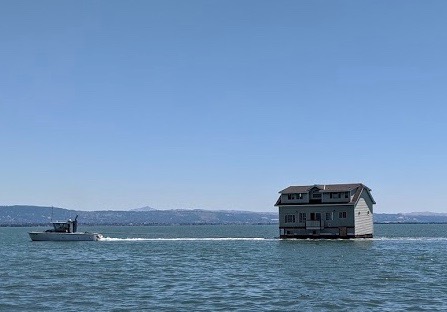
Thanks very much to Brian for the photo. Brian also gave us the background on this pic, but we’ll save that for when we announce the winner and top 10 comments in the October magazine
Good luck!
Westwind Boat Detailing
Countdown to America’s Cup 36
The proverbial clock is ticking. The preparation window narrows and the training pace quickens for the remaining three viable challengers as the Southern Hemisphere winter turns to an America’s Cup spring in Auckland, New Zealand.
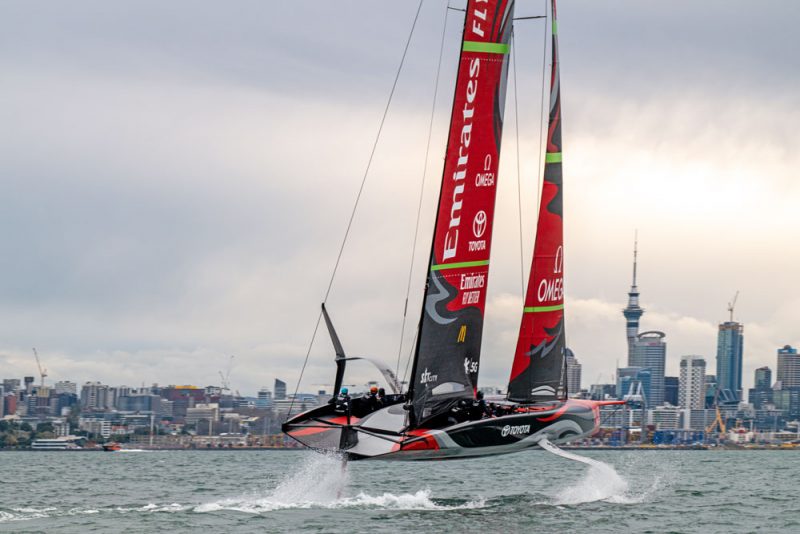
Unfortunately, after more than a hundred days of bliss, the Kiwi Kingdom had a COVID-19 blip on their radar that all but ensures there will be no international fans in the stands for the Prada Cup playoffs and the eventual America’s Cup finals next year.
The Youth America’s Cup has now been canceled, which put yet another damper on the whole affair. Even if any of us diehard fans are let in, there will be a steep price to pay for the first two weeks in Auckland: having to spend untold thousands to quarantine in a government-sanctioned hotel.
On the plus side, American Magic has put their AC75 Defiant through the paces since being let in the New Zealand door a couple of months ago. The team has survived a few close calls and then a capsize, though it was more like a rollover, on their way to getting their team ready as they await their second boat, which was “secretly” flown to New Zealand last week.

The New York Yacht Club entry has turned up the intensity a notch by naming their new boat Patriot, taking direct aim at the Kiwis and targeting their sights on the hardware that sits inside the Royal New Zealand Yacht Squadron clubhouse.
As for the traditional christening ceremony for Patriot, American Magic skipper Terry Hutchinson told the AP’s Bernie Wilson, “There will be load tests, a quick crack of the bottle on the bow, and she’ll go!”
“When comparing the build of Boat #2 to Boat #1, certain parts of the build were easier and others more difficult,” said American Magic designer Brandon Linton. “This is a different design to Defiant, so there are limitations to being able to capitalize on doing the same things twice.”
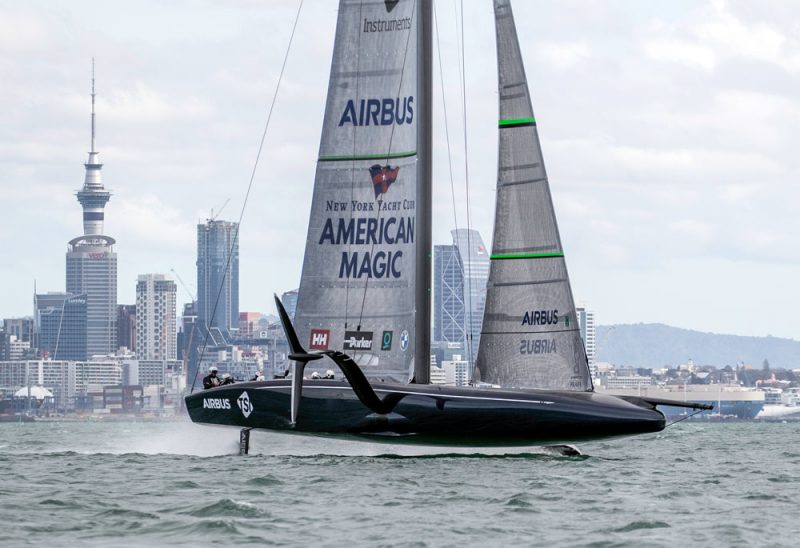
The other two challengers have wrapped up their respective training sessions at home and will be shipping all their people, parts and pieces down to Auckland shortly. INEOS UK are splitting tacks: packing Britannia 1 on a cargo ship a few weeks back and flying Britannia 2 via the massive Russian-built Antonov 124 cargo transport plane later this month to save valuable time.
The Luna Rossa Prada Pirelli AC75 left Cagliari last week and will arrive sometime in mid-October. Team director and skipper Max Sirena made no bones in his remarks as the team departed for New Zealand. “We leave after three years of intensive work,” said Sirena. “We are aware another chapter in this adventure awaits, one that will require even more commitment and determination in view of the ultimate goal.”
The Weird Weather Phenomena and Piercing Prose of ‘Moby-Dick’
Going down a bit of a rabbit hole a few weeks ago — inspired in no small part by boredom and a two-week-long lack of wind — I was searching for my favorite passage in Moby-Dick or The Whale. Flipping through my worn, dog-eared copy, I finally found it the words that were at once nothing like I remembered, but still quite familiar:
“The not-yet-subsided sea rolled in long slow billows of mighty bulk and, striding in the Pequod’s gurgling track, pushed her on like giants’ palms outspread. The strong, unstaggering breeze abounded so, that sky and air seemed vast outbellying sails, the whole world boomed before the wind. Muffled in the full morning light, the invisible sun was known only by the spread intensity of his place, where his bayonet rays moved on in stacks. Emblazonings, as of crowned Babylonian kings and queens, reigned over everything. The sea was as a crucible of molten gold, that bubblingly leaps with light and heat,”
So reads the first paragraph of Chapter 124, The Needle, in Herman Melville’s masterpiece.

And here’s the larger context of The Needle: After a night of thunder and lightning, Captain Ahab appeared on deck, and “hurried toward the helm, caught one glimpse of the compasses; his uplifted arm slowly fell; for a moment he almost seemed to stagger . . . and lo! the two compasses pointed east, and the Pequod was as infallibly going west. But ere the first wild alarm could get out abroad among the crew, the old man with a rigid laugh exclaimed, ‘I have it! It has happened before . . . last night’s thunder turned our compasses — that’s all. Thou hast before now heard of such a thing, I take it.'”
Hast thou ever heard of or experienced such a thing, Latitude Nation? Has your compass ever gone 180 degrees in the wrong direction, or been generally flummoxed in the wake of an electrical storm? Please comment below, or email us here. And, as long as we’re asking questions: When did you read/have you read Moby-Dick? Was it required reading in high school or college? Did you “get it,” or did you wonder, “What the hell is this book?”
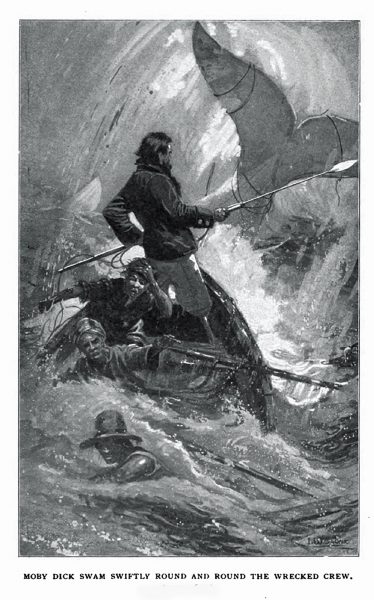
How does one categorize Moby-Dick? Sea story? Biblical balladry? A thorough dive into the history of whaling and cetology (the branch of zoology dealing with whales, dolphins, and porpoises)? Melville’s opus is all of these things and more. “In writing a high tragedy about a whaling voyage, Melville is emulating and paying tribute to Shakespeare and the larger literary tradition, but he’s also revising and Americanising it at the same time,” wrote The Independent in 2016, calling Moby-Dick a “playful, experimental novel.”
Though it’s been over a decade since I read The Whale from cover to cover, The Needle stands out as unusually upbeat. Which is to say that the monomaniacal Ahab is happy — even stoked. Melville wrote, “Long maintaining an enchanted silence, Ahab stood apart; and every time the teetering ship loweringly pitched down her bowsprit, he turned to eye the bright sun’s rays produced ahead; and when she profoundly settled by the stern, he turned behind, and saw the sun’s rearward place, and how the same yellow rays were blending with his undeviating wake. ‘Ha, ha, my ship! thou mightest well be taken now for the sea-chariot of the sun. Ho, ho! all ye nations before my prow, I bring the sun to ye! Yoke on the further billows; hallo! a tandem, I drive the sea!'”
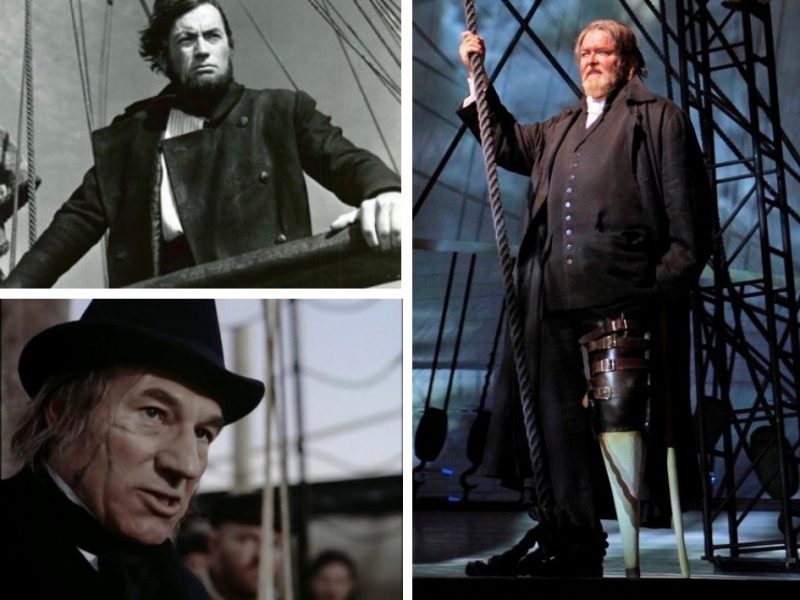
In my recollection, there’s no other time in Moby-Dick when Ahab is so decidedly feeling it. For a moment, he has forgotten his all-consuming vengeance against the white whale that so grievously maimed him, and instead is enjoying a glorious morning of sailing.
It seems that Melville was feeling it, too, when he wrote Moby-Dick, and showing off his considerable, once-in-a-generation talent. About Melville, The Independent said, “When you read this great, bamboozling novel, it is helpful to remember that it is the work of late-blooming autodidact, suddenly desperate to get in on the literary action.”
Not that Melville was fully appreciated when Moby-Dick was published in October 1851.
“So much trash,” according to one review. “Wantonly eccentric; outrageously bombastic;” “The style is maniacal — mad as a March hare,” read a 2019 New Yorker article titled Herman Melville at Home, which summarized some of the initial reviews of what is now considered one of the greatest American novels. “Faulty as the book may be, it bears the marks of ‘unquestionable genius’ was about the best that was generally said,” the New Yorker continued. “Captain Ahab is a striking conception, yet if we had as much of Hamlet or Macbeth as Mr. Melville gives us of Ahab, we should be tired even of their sublime company.”
Ahab eventually repairs the compass by replacing the needle with the steel head of a lance, then hammering it to elicit the metal’s magnetism. Melville wrote, “Ahab, who had been intently watching for this result, stepped frankly back from the binnacle, and pointing his stretched arm towards it, exclaimed, ‘Look ye, for yourselves, if Ahab be not lord of the level loadstone! The sun is east, and that compass swears it!'” But the captain’s flash of reverie has already vanished.
“In his fiery eyes of scorn and triumph, you then saw Ahab in all his fatal pride.”


